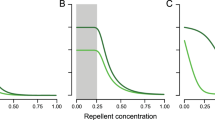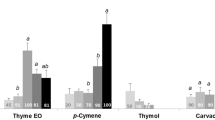Abstract
CONCERN over the contamination of the environment by pesticide residues is directing attention to the possibility of combating insect pests by means of chemical or other influences which, without being toxic, are able to affect an organism adversely by inducing deviations from the normal behaviour. Insect repellents and insect attractants (both chemical and optical) are familiar examples, but they do not exhaust the possibilities. For example, a sex-attractant scent could be distributed broadcast in order to confuse or attenuate the male response, and other olfactory signals might be used to induce a female to oviposit at the wrong time or place. Other possibilities no doubt remain to be discovered.
This is a preview of subscription content, access via your institution
Access options
Subscribe to this journal
Receive 51 print issues and online access
$199.00 per year
only $3.90 per issue
Buy this article
- Purchase on Springer Link
- Instant access to full article PDF
Prices may be subject to local taxes which are calculated during checkout
Similar content being viewed by others
References
Karlson, P., and Lüscher, M., Nature, 183, 55 (1959).
Author information
Authors and Affiliations
Rights and permissions
About this article
Cite this article
WRIGHT, R. ‘Metarchon’ : a New Term for a Class of Non-toxic Pest Control Agents. Nature 204, 603–604 (1964). https://doi.org/10.1038/204603b0
Issue Date:
DOI: https://doi.org/10.1038/204603b0
This article is cited by
Comments
By submitting a comment you agree to abide by our Terms and Community Guidelines. If you find something abusive or that does not comply with our terms or guidelines please flag it as inappropriate.



